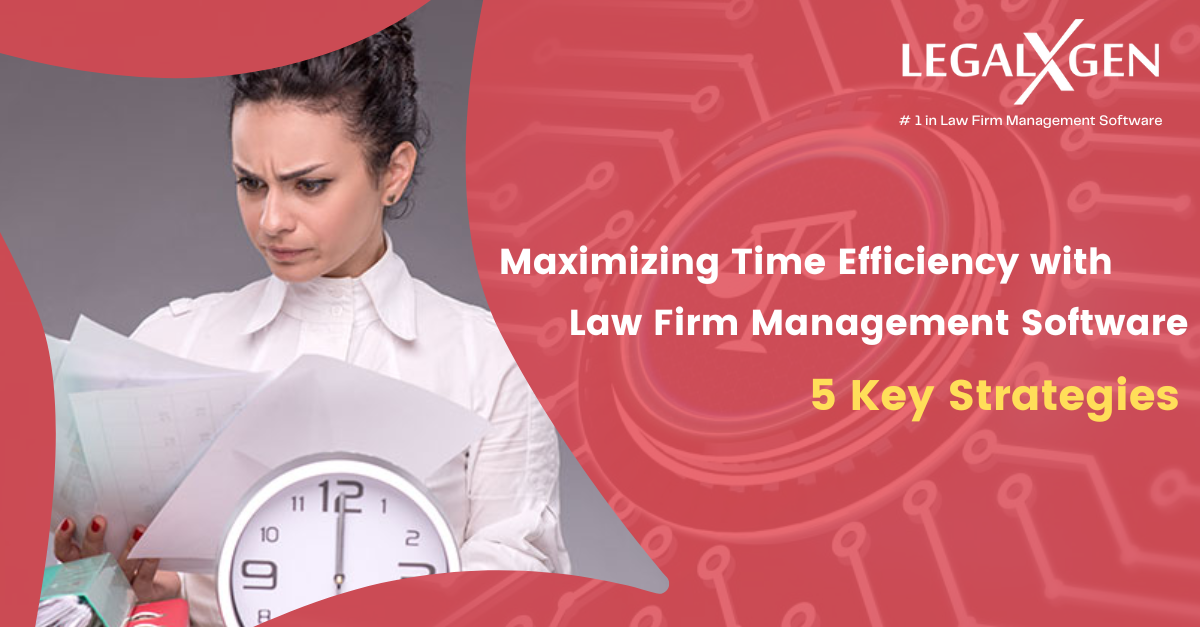

In the fast-paced world of law practice, managing time effectively is crucial for law firms to stay competitive and deliver outstanding results for their clients.
Embracing technology, such as law firm software management, can revolutionize the way attorneys and legal professionals operate, saving time, reducing errors, and ultimately increasing overall productivity.
In this blog, we will explore five powerful ways law firm software can help manage time effectively, ultimately benefiting law firms of all sizes.
- Automate Routine Tasks:
Time is a valuable resource in any law firm, and repetitive manual tasks can be a major time sink. Law firm software can automate routine tasks such as document generation, appointment scheduling, and client communications.
By reducing the time spent on repetitive tasks, lawyers can focus on more critical aspects of their practice, such as case analysis and strategy development.
How can law firm software automate document generation and improve efficiency?
Law firm software can create customizable templates for various legal documents, enabling attorneys to generate pleadings, contracts, and agreements with just a few clicks. - Centralize Case Information:
Traditional paper-based file systems can be cumbersome, leading to disorganization and inefficiency. Law firm software management systems offer a centralized repository for case-related information. Instead of scattered files and folders, all case-related documents, notes, and communications can be stored securely in one place. This not only saves time but also ensures easy access to critical information for everyone involved in the case.
How can centralizing case information improve collaboration within the law firm?
Centralized case information fosters seamless collaboration among attorneys, paralegals, and support staff. Everyone can access the most up-to-date information, leading to better teamwork and decision-making. - Calendar and Task Management:
Lawyers often juggle multiple cases with tight deadlines. Missing important court dates or submission deadlines can have severe consequences. Law firm software offers robust calendar and task management features that allow attorneys to stay organized and on top of their schedules.
Can law firm software sync with personal calendars for better time management?
Yes, most law firm software solutions integrate with popular calendar applications like Zoho Calendar or Microsoft Outlook, ensuring that lawyers never miss an important event or task. - Time Tracking and Billing:
Accurately tracking billable hours is crucial for law firms’ financial health. Manual time tracking can be error-prone and time-consuming. Law firm software comes with built-in time tracking tools that record billable hours automatically, reducing the risk of underbilling or overbilling clients.
How can automated time tracking benefit both lawyers and clients?
Automated time tracking ensures lawyers get compensated for all billable hours worked, and clients receive transparent, detailed invoices, fostering trust and healthy client relationships. - Billable & Non-Billable Hours:
Understanding the allocation of billable and non-billable hours is essential for optimizing law firm productivity. Law firm software helps track the time spent on client-related tasks (billable) and administrative or internal activities (non-billable), allowing firms to make informed decisions about resource allocation.
Can law firm software generate reports on billable vs. non-billable hours for performance analysis?
Absolutely! Law firm software can generate insightful reports, giving partners and managers valuable data to evaluate individual and overall performance, identify areas of improvement, and optimize their billing strategies.
Conclusion:
Embracing law firm software management solutions can revolutionize the way legal professionals manage their time and resources. By automating routine tasks, centralizing case information, efficiently managing calendars and tasks, tracking billable hours, and distinguishing billable from non-billable hours, law firms can enhance productivity, deliver exceptional client service, and achieve sustainable growth.
In the competitive legal landscape, investing in these time management strategies can truly be a game-changer for any law firm looking to stay ahead in the race.

Market Research Analyst with a Master’s in Marketing and Analytical Experience.
 English
English French
French German
German